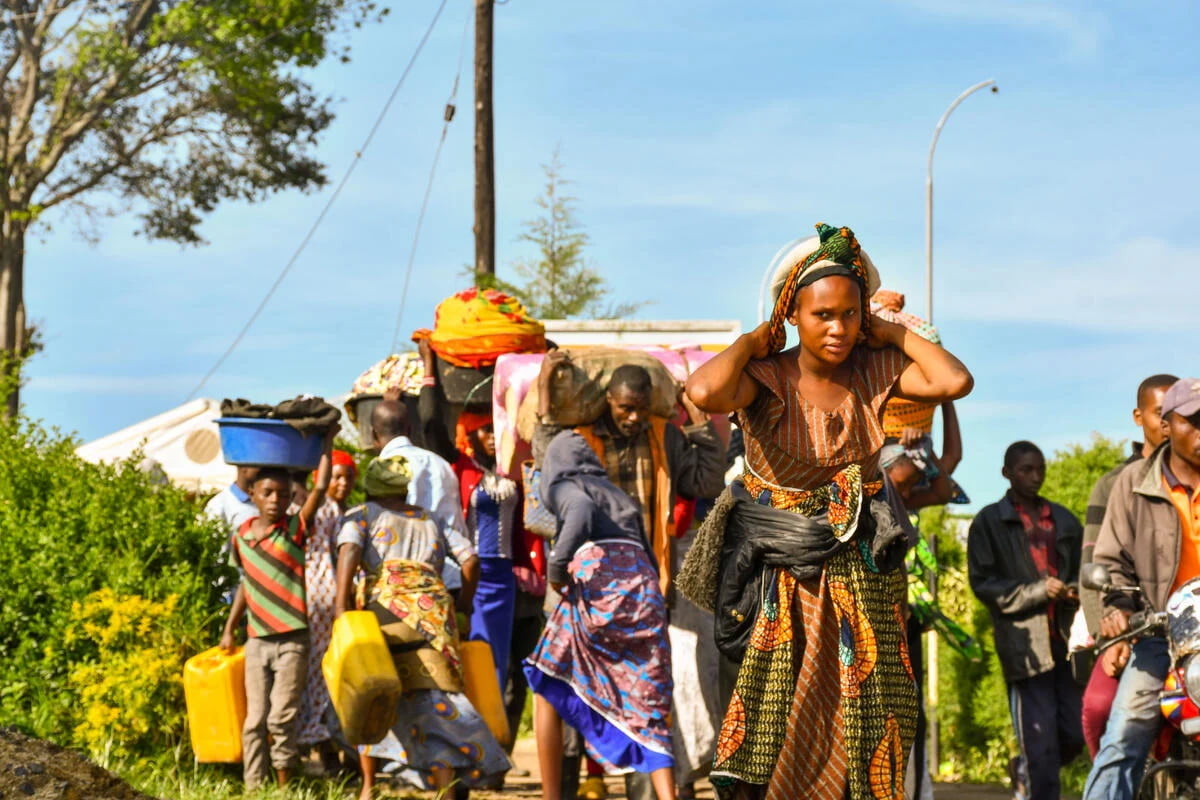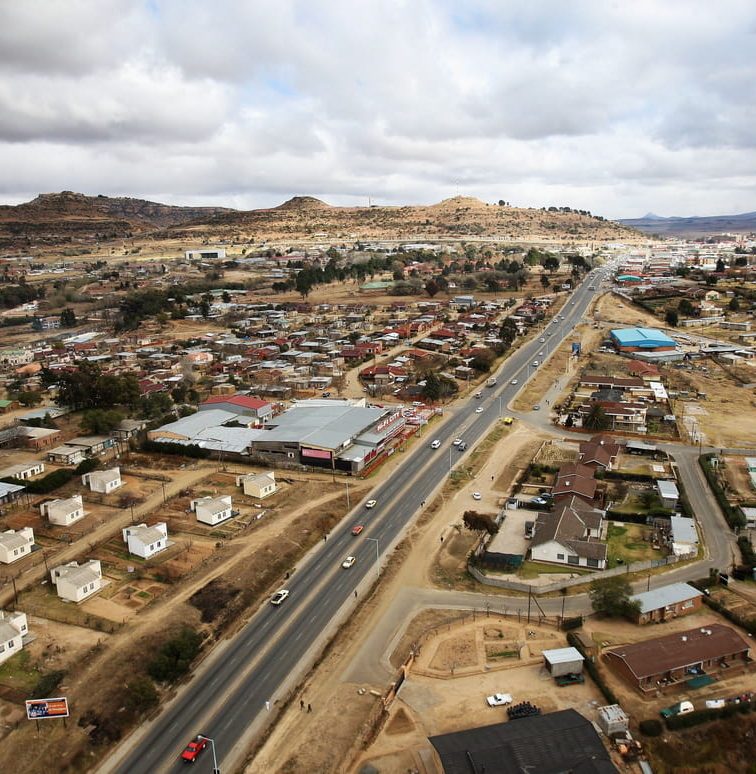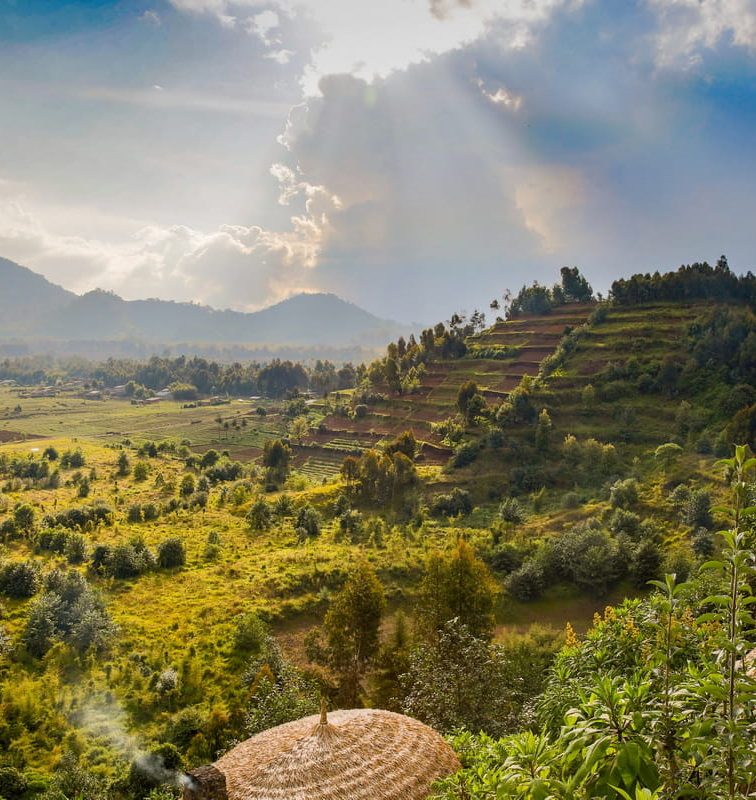Welcome to the land of surprises and smiles – Uganda! Imagine a place where a “Rolex” is not a watch but a delicious street food, and punctuality might just signal a lower social status.
Ever heard of a country where stepping over food is taboo, or a simple greeting could wait until 1 pm? Yes, that’s Uganda for you – a delightful blend of quirky traditions and warm, engaging culture. From the playful misuse of everyday English to the bizarre taxi-hailing gestures, every corner of this vibrant nation is a story waiting to be told.
Get ready to embark on a journey through the humorous and intriguing world of fun facts about Uganda.
1. Matooke: The Staple on Uganda’s Currency
Matooke, a starchy banana variety, is a staple food deeply ingrained in Uganda’s culture and cuisine. So much so, that it has been featured on the Ugandan shilling note, symbolizing its national importance.
Originating from the African Great Lakes region, matooke is not just food; it’s a part of Uganda’s identity. This green, unripe banana is steam-cooked and often mashed, forming the core of many traditional dishes.
While locals relish its taste, foreigners sometimes find it bland, requiring sauces to enhance its flavor. Matooke’s prominence on currency underscores its vital role in Ugandan life and diet.

Image: Pinterest
2. Kampala’s Street Shopping Extravaganza
Kampala, the vibrant capital of Uganda, is a haven for street shopping enthusiasts. From the bustling Owino Market, renowned for its second-hand items, to the Nakasero Market’s fresh farm produce, the city’s streets are alive with diverse shopping experiences. Kikuubo shopping zone, sitting at the heart of Kampala, offers a myriad of products including hair products, foodstuffs, and home equipment.
Each market in Kampala has its unique charm, inviting shoppers to test their bargaining skills in a lively and chaotic atmosphere. The street markets of Kampala are not just shopping venues; they are a vivid representation of the city’s dynamic culture and energy.
3. “Funny” in Uganda: A Word of Two Faces
In Uganda, the word “funny” carries a unique duality in its meaning. While in many places “funny” is solely linked to humor and laughter, in Uganda, it also conveys a sense of acting strangely or inappropriately. The interpretation of “funny” hinges on the context of the conversation or situation.
This linguistic twist reflects the rich and diverse nature of language in Uganda, where a single word can encapsulate a range of meanings, adding depth and color to everyday communication.
4. Ugandan Guesthouses: Safety after Dark
In Uganda’s urban areas, particularly Kampala, guesthouses prioritize safety by locking their gates around 10:30 PM. This precaution, stemming from the country’s heightened caution against nighttime crime, is a standard practice to protect guests from potential security risks.
The locking of gates after dark is not just for securing the property but also acts as a safeguard for the guests against common crimes like petty theft and break-ins, which tend to increase during nighttime.
5. The Ugandan Rolex: A Delightful Twist
In Uganda, the term “Rolex” takes on a deliciously different meaning. Unlike the luxury watch, a Ugandan Rolex is a popular street food, consisting of an omelet filled with veggies like cabbage, tomato, and onion, all rolled up in a chapati.
This snack is a staple in Ugandan cuisine and is widely enjoyed for its affordability, convenience, and savory taste. The creation of the Rolex is attributed to a creative chapati seller from Busoga, Eastern Uganda, and it quickly became a favorite among students at Makerere University in Kampala for its quick and filling nature.

Image: matadornetwork.com
6. Ugandan Parenting: A Blend of Love and Quirks
Ugandan parenting is often marked by a mix of strictness and affection. A common humorous trait observed is parents calling their children from afar for small tasks, even if it’s just to pass something within reach.
This habit, while sometimes seen as annoying, underscores the close familial bonds and a sense of togetherness in Ugandan families. It reflects the interplay of authority and care that shapes the upbringing of children in Ugandan culture.
7. Ugandan Indirect Communication: A Cultural Art
In Ugandan culture, communication often takes an indirect approach, using stories and proverbs to convey messages. This style requires listeners to be attentive and perceptive, as the true meaning is often layered within these narratives.
Understanding the subtleties of this communication form is crucial for meaningful interaction in Uganda, reflecting the society’s emphasis on preserving harmony and respect in conversations.
8. Ugandan Punctuality: A Reflection of Status
In Uganda, punctuality is viewed through a unique cultural lens. Unlike many Western societies where being on time is often critical, Ugandans generally have a more relaxed approach to time. This attitude extends to social events, where arriving later than the scheduled time is common, especially among individuals of higher social status.
It’s a fascinating aspect of Ugandan culture, where time is perceived more fluidly and social standing influences punctuality norms.
9. Ugandan Rural Dress Code: Modesty in Fashion
In Uganda’s rural areas, women’s dress code often adheres to modesty, particularly when it comes to covering their legs. This practice is deeply rooted in traditional values, where exposing too much leg can lead to undesirable labels and societal judgment.
Women typically wear clothing that covers their legs extensively, reflecting the cultural emphasis on modesty and respectability.
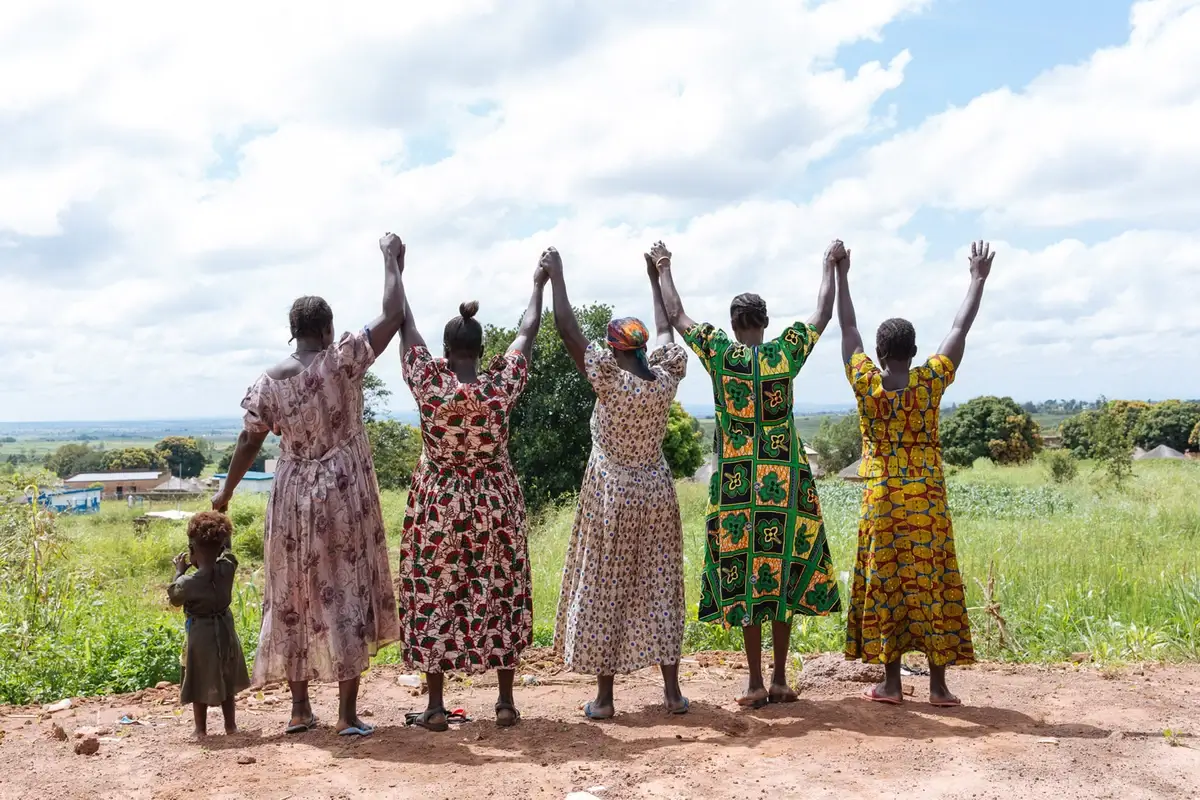
Image: landnet.ug
10. Hailing Taxis in Uganda: A Language of Gestures
In urban Uganda, hailing a taxi involves a unique set of hand gestures, each with a specific meaning. Raising a hand straight upwards signals a need for a long-distance ride. Pointing downwards indicates a nearby destination. For intermediate distances, a flat hand is held open towards the ground at waist level.
These gestures are a practical, non-verbal communication tool, reflecting Uganda’s rich and nuanced cultural tapestry.
11. Ugandan Men’s Fashion: The Tradition of Trousers
In Uganda, men’s fashion adheres to a traditional and respectful standard, particularly favoring long trousers over shorts. This preference is deeply rooted in cultural norms where wearing shorts is typically associated with young boys or schoolchildren.
In both urban and rural settings, adult men opt for trousers as a mark of maturity and respectability, reflecting their cultural values and societal expectations.
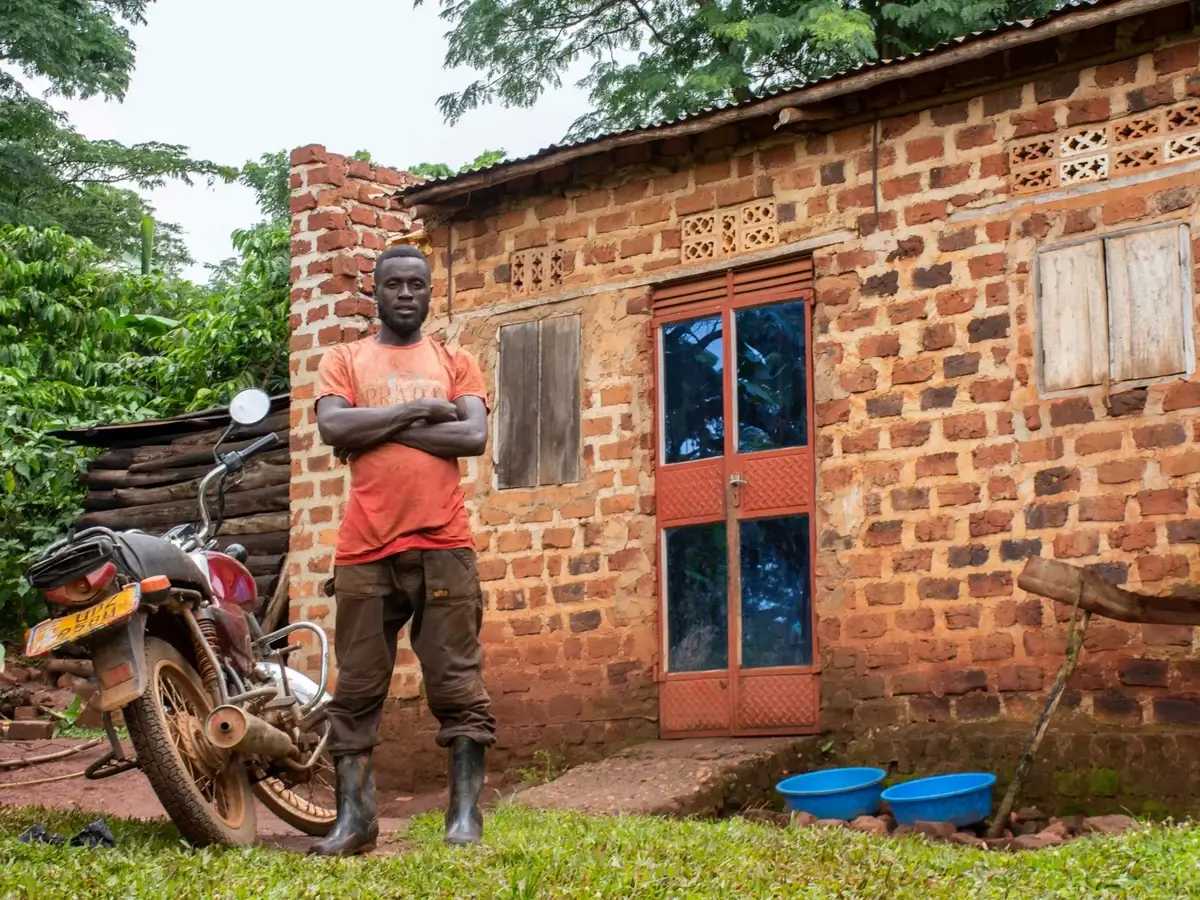
Image: aljazeera.com
12. Wakaliwood: Uganda’s Unique Film Scene
Uganda’s film industry, particularly Wakaliwood, has gained international recognition for its unique and humorous approach to movie-making. Located in the slum of Wakaliga near Kampala, Wakaliwood is renowned for producing low-budget, action-packed films, with “Who Killed Captain Alex?” as its most iconic creation. This film became a viral sensation, showcasing Uganda’s innovative and resourceful filmmaking style.
Wakaliwood’s movies, characterized by their action, comedy, and distinct narrative style, have introduced a new wave in African cinema, gaining a global following for their entertaining and creative storytelling.
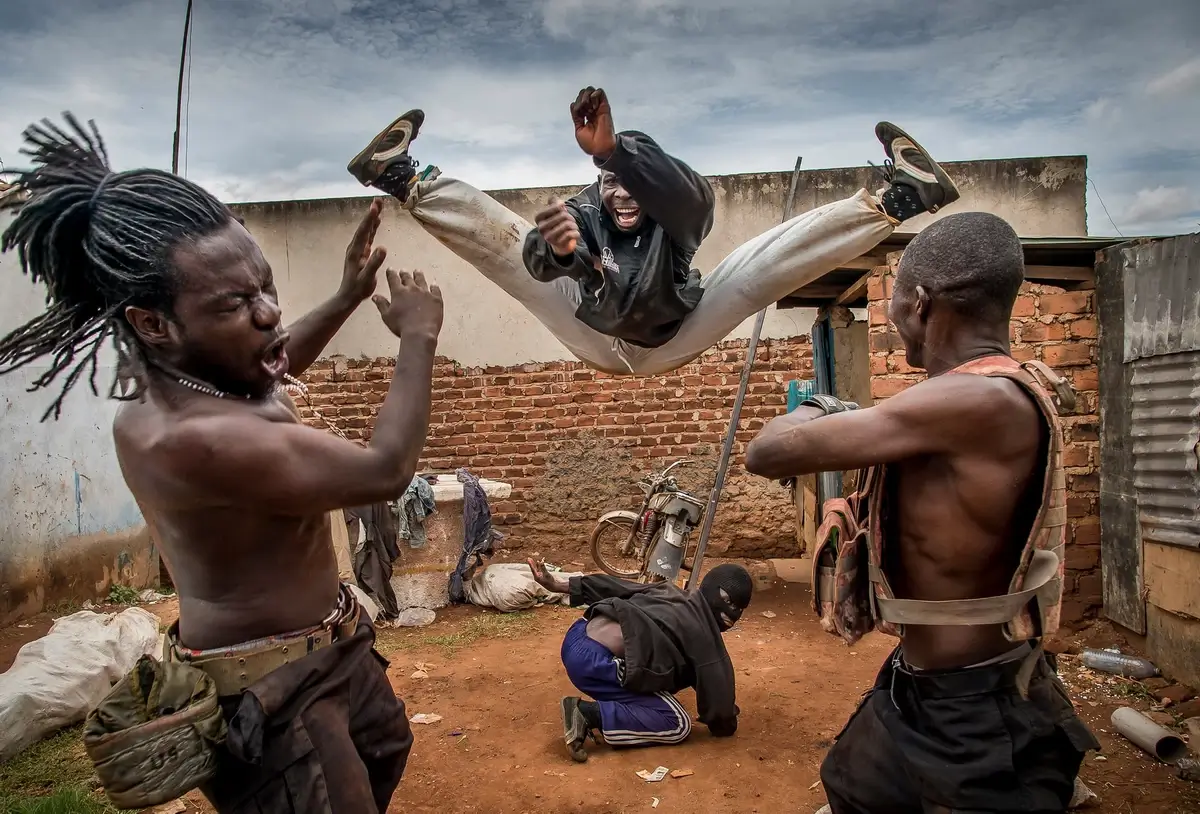
A scene from a Wakaliwood movie. Image: theguardian.com
13. Uglish: The Quirks of Ugandan English
Ugandan English, popularly known as “Uglish,” is a unique version of English filled with local flavors and nuances. In Uganda, certain phrases have different meanings compared to standard English. For instance, “extend, extend” is a common Uglish phrase used to ask someone to move over, unlike its standard English usage.
This linguistic variation highlights the creative adaptation of English in Uganda, blending local expressions and colloquialisms to form a distinct dialect that’s both intriguing and endearing.
14. “Mzungu” – The Term for Foreigners in Uganda
In Uganda, the term “Mzungu” is commonly used to refer to foreigners, especially those of European descent.
Originally a Bantu word meaning “wanderer” or “someone who roams around,” it was first used to describe Arab, Indian, and European traders and explorers in the 18th century.
Today, “Mzungu” has evolved to denote people of means and is not solely based on skin color. It can affectionately or casually refer to any foreigner, reflecting Uganda’s multicultural interactions.
15. Uganda’s Iconic “Taxi” Minivans
In Uganda, mass transit takes a unique form with white mini-vans, widely known as “taxis.” These vans are a common sight, bustling through the streets, offering an affordable and accessible means of transport for the locals.
Their presence is a distinctive feature of Ugandan city life, reflecting the ingenuity and practicality of local transport solutions.

Image: matadornetwork.com
16. Uganda’s Timekeeping: No Daylight Saving Time
Uganda consistently observes Eastern Africa Time (EAT) throughout the year, meaning it does not participate in daylight saving time. This policy aligns with the country’s equatorial location, which experiences minimal variation in daylight hours across seasons.
As a result, the need to adjust clocks for extended daylight, a common practice in many countries, is unnecessary in Uganda.
17. Caution: Tap Water in Uganda
In Uganda, it’s widely advised not to drink tap water directly due to potential contamination. The water sources often contain parasites, bacteria, and chemicals, making it unsafe without proper treatment.
Boiling, filtering, or treating water is essential before consumption. Bottled water is a safer choice, though it’s important to ensure it comes from a reputable source and the seal is intact.
For longer stays or outdoor activities, carrying a high-quality water filter can provide a reliable supply of safe water.
18. Silent Threat: Uganda’s Anopheles Mosquitoes
Uganda’s malaria-carrying Anopheles mosquitoes, including the dominant species Anopheles gambiae, are known for their silent and nocturnal behavior. Active predominantly at night, these mosquitoes quietly feed on human blood, making them effective vectors for malaria transmission.
Their silent nature makes it challenging to detect their presence, underscoring the importance of preventive measures like mosquito nets and indoor residual spraying in Uganda to combat malaria.
19. The Heartbeat of Uganda: “The New Vision” and “The Daily Monitor”
“The New Vision” and “The Daily Monitor” stand as Uganda’s major English-language newspapers, each capturing the pulse of the nation in its own unique way. “The New Vision” is state-owned and enjoys the largest nationwide circulation, while “The Daily Monitor” operates independently.
Both newspapers dominate Uganda’s print media landscape, offering a blend of news, analysis, and commentary crucial for understanding the country’s dynamic socio-political climate.
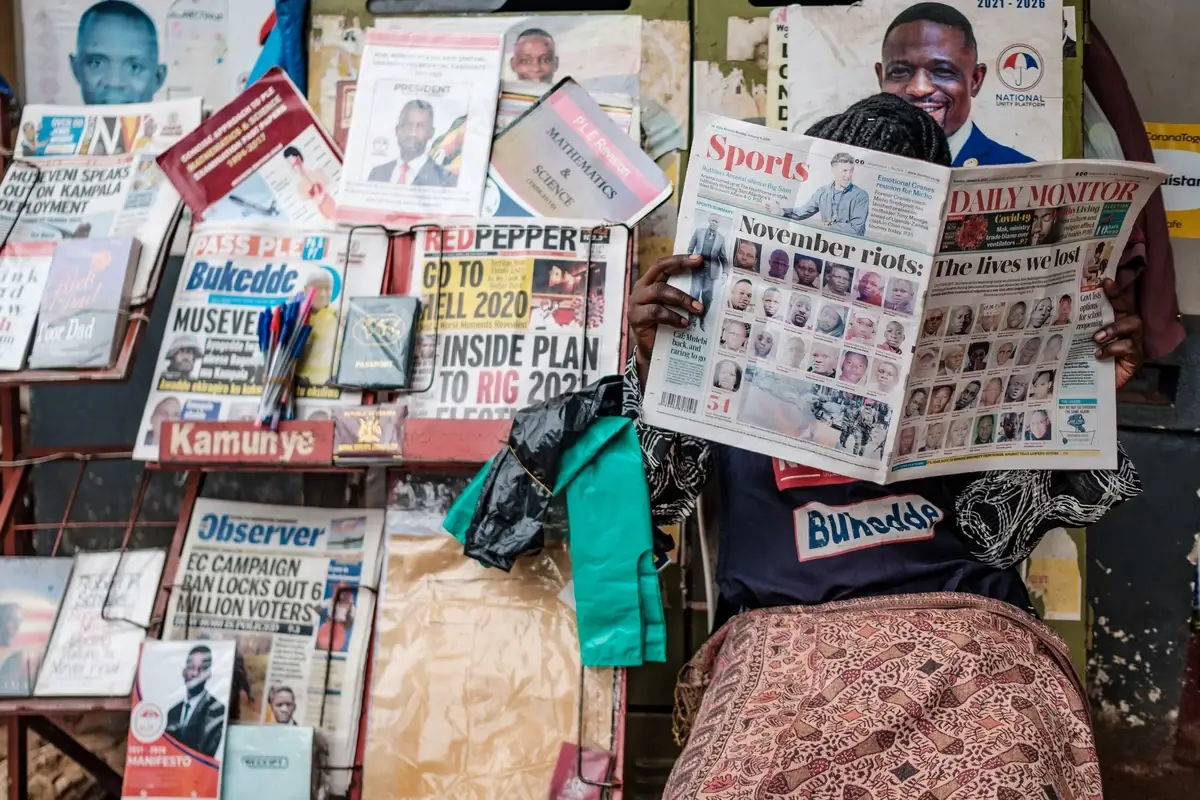
Image: cpj.org
20. The Irresistible Ugandan Roast Pork
Ugandan cuisine boasts an array of delightful dishes, with roast pork, known locally as Kikalayi, being a standout.
Renowned for its savory taste, Kikalayi is a favorite at ‘pork joints’ across Uganda, often accompanied by a range of sides and enjoyed in a communal setting. These pork joints are not just eateries but social gathering spots, reflecting the communal nature of Ugandan dining.
Kikalayi is celebrated for its unique preparation method and is a must-try for pork enthusiasts exploring Uganda’s rich culinary landscape.
21. Gorilla Trekking in Uganda: The Price of Adventure
In Uganda, a key highlight for many visitors is the opportunity to trek mountain gorillas. This unique experience comes with a cost – a gorilla permit in Uganda is priced at USD 700 per person per day. The permit includes security provided by two armed rangers and a knowledgeable guide leading you to the gorillas.
It’s vital to book these permits in advance, especially during peak travel months, due to their high demand and limited availability.
Image: ayoma.co.ug
22. Ugandan Greeting Customs: More Than Just “Hi”
In Uganda, greetings are a vital part of social etiquette, going beyond a simple “hi”. The common formal greeting is “Olyotya?” which translates to “How are you?” in English. This phrase is used across various times of the day, from morning till evening, with slight variations like adding “gyebale ko” in the afternoon or evening. Informally, “Ssalamu” is equivalent to “Hi”, used among friends and in casual settings.
These greetings reflect the Ugandan culture’s emphasis on respect and building rapport.
23. Late Dining in Uganda
In Uganda, the timing for meals typically leans towards later hours. Lunch is often considered the first substantial meal of the day and is usually served around or after 1 PM. Dinner, on the other hand, extends into the later hours of the evening, commonly taken after 9 PM.
This late dining schedule is reflective of the local lifestyle and working patterns, with dinner being a significant meal where families gather and socialize.
24. Swimming Safely in Uganda: The Bilharzia Risk
Swimming in Uganda’s lakes and rivers presents a risk of Bilharzia, a parasitic infection. To minimize this risk, it’s advised to avoid swimming near villages, stay in the water for less than ten minutes, and dry off vigorously with a towel afterwards. Insect repellent may offer some protection.
While not all water bodies are infested, caution is always recommended, as symptoms can take weeks or months to appear. For guaranteed safety, swimming in hotel or lodge pools is the best option.

A no swimming sign next to a Lake Victoria beach in Entebbe, Uganda. RTI Fights NTDs / Flickr
25. Christian and Muslim Harmony in Uganda
Uganda is a noteworthy example of religious coexistence, where Christians and Muslims live together harmoniously. This peaceful inter-religious relationship is deeply rooted in African culture and everyday community life. Families of different faiths often share meals, celebrate religious festivals together, and jointly contribute to community development.
Such harmonious living is a testament to Uganda’s ability to embrace religious diversity, making it a unique and valuable model of interfaith relations for the world.
26. Ugandan English: The L and R Twist
In Ugandan English, known colloquially as “Uglish,” the pronunciation of the letters “L” and “R” often presents a unique characteristic. This linguistic phenomenon is influenced by the varying levels of education and exposure to English in the country. Native speakers and pronunciation guides are not widely available, leading to reliance on spelling for pronunciation cues.
As a result, words like “railway” might be pronounced with an interchanged “L” and “R,” showcasing the distinctive flavor of Ugandan English.
27. Ugandan Taboo: Stepping Over Food
In Uganda, stepping over a bowl of food is considered a significant cultural taboo. This practice is rooted in deep respect for food as a vital life-sustaining resource, and stepping over it is seen as disrespectful.
Such taboos reflect the broader values of Ugandan society, where food is treated with reverence, symbolizing nourishment, community, and the hard work of those who prepare and provide it.
28. Nyege Nyege Music Festival: Uganda’s Musical Extravaganza
The Nyege Nyege Music Festival is a significant cultural event in Uganda, celebrated annually near Jinja. Known as “Nyege Wonderland,” this festival spans about 50 acres, encompassing the Source of the Nile, Jinja Showgrounds, and Jinja Golf Course.
It features a rich mix of music and art, drawing revelers from around the world to enjoy diverse performances in a vibrant atmosphere. This festival not only showcases Uganda’s rich musical heritage but also highlights Jinja as a prime destination for cultural tourism.
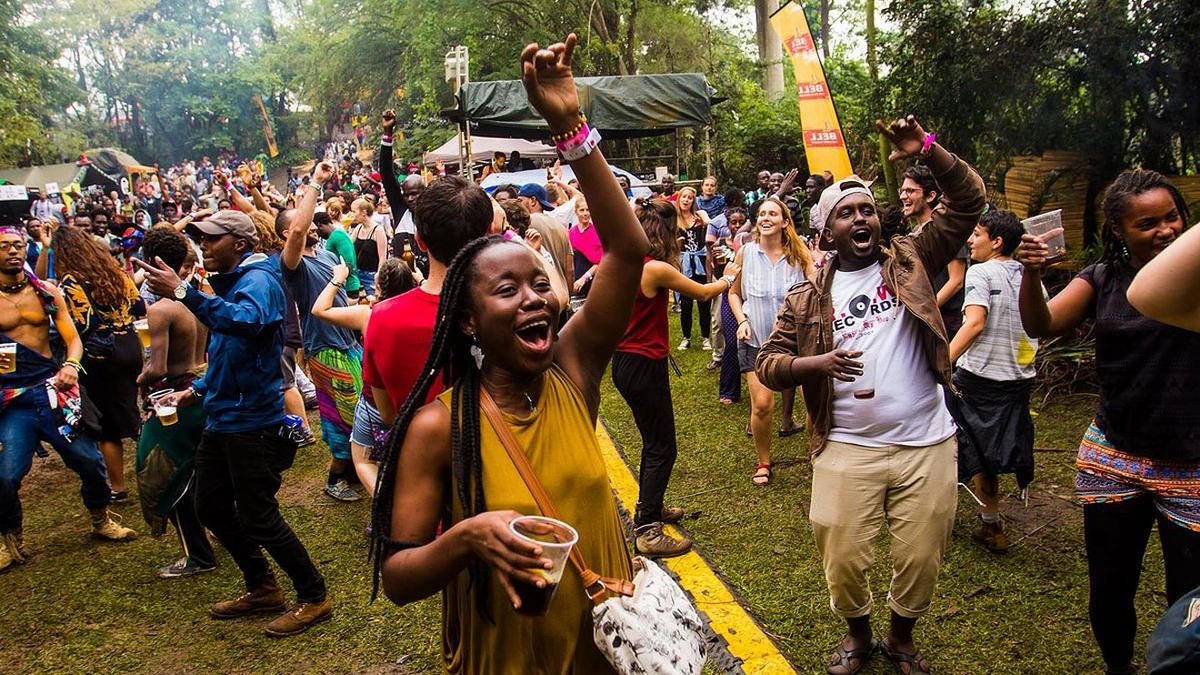
Image: groove.de
29. The Kneeling Tradition in Baganda Culture
In the Baganda tribe, one of Uganda’s largest ethnic groups, women traditionally kneel when greeting or serving food to their husbands, as well as when greeting other men and elders. This practice, deeply ingrained in the culture, occurs in various settings, whether at home, on the road, or in public spaces.
While the tradition symbolizes obedience and humility, it’s been a topic of debate, especially among younger generations and women’s rights activists, who question its relevance and association with submissive attitudes in contemporary society.

This Is Africa / facebook.com
30. “G-Nuts” in Uganda: More Than Just Peanuts
In Uganda, peanuts are commonly referred to as “g-nuts,” short for groundnuts. They hold a significant place in Ugandan agriculture, being the second most important legume after beans. G-nuts are not only a key food source but have also become a commercial crop.
They are predominantly cultivated by smallholder farmers, contributing to food security. The cultivation and consumption of g-nuts have spread across various regions in Uganda, making them a staple in the Ugandan diet.
FAQ
What is Uganda special for?
Uganda is special for its incredible biodiversity, including lush rainforests, diverse wildlife, and beautiful landscapes. It’s particularly renowned for its mountain gorillas and bird species. The country also has a rich cultural heritage with over 56 tribes, each with its unique customs and traditions.
What is Uganda rich in?
Uganda is rich in natural resources and biodiversity. It boasts vast landscapes ranging from the snow-capped Rwenzori Mountains to the immense Lake Victoria. The country is home to numerous wildlife species, including half of the world’s remaining mountain gorillas, and over 1,000 bird species, making it a haven for wildlife enthusiasts.
What is the Big Five in Uganda?
The “Big Five” in Uganda refers to five of the most sought-after wildlife to see on safari: lions, leopards, African elephants, Cape buffalos, and rhinoceroses. These animals are renowned for their majesty and are a major draw for tourists visiting Uganda’s national parks.
What was Uganda original name?
Uganda’s original name isn’t clearly defined as the region was comprised of several kingdoms with their own names before colonial times. However, the name “Uganda” is derived from the Buganda kingdom, which encompassed the southern part of the country including the capital, Kampala.
Is Uganda a rich or poor?
Economically, Uganda is considered a developing country and faces challenges like poverty, corruption, and limited access to education and healthcare. Despite its rich natural resources and growing economy, a significant portion of its population still lives below the poverty line.
Why is Uganda called the Pearl of Africa?
Uganda is called the “Pearl of Africa” due to its extraordinary natural beauty, diverse ecosystems, and abundant wildlife. This term was popularized by Winston Churchill in his 1908 book “My African Journey,” reflecting the country’s unique landscape and rich biodiversity.
Why do people love Uganda?
People love Uganda for its stunning natural scenery, rich cultural diversity, and friendly locals. The country offers a unique blend of wildlife experiences, including gorilla trekking, and has a vibrant cultural scene with various traditional dances, music, and art. Uganda’s warm and welcoming nature makes it a cherished destination for travelers.
Why is Uganda so beautiful?
Uganda is considered beautiful due to its diverse landscapes, which include tropical rainforests, savannas, mountains, and lakes. Its biodiversity, with an array of wildlife and bird species, adds to its natural beauty. The warm climate, vibrant cultures, and the presence of the majestic Nile River also contribute to Uganda’s allure.


